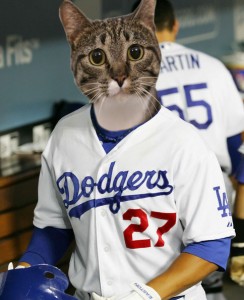Wellington Castillo
The author cautions the following before clicking “Read the rest of this entry:” Nothing good happens after midnight on the internet, particularly after writing about the Cubs.
You’ve been warned.
The author cautions the following before clicking “Read the rest of this entry:” Nothing good happens after midnight on the internet, particularly after writing about the Cubs.
You’ve been warned.
We are standing at the precipice of a Cuban Missile-like conflict that could ruin the game of baseball as we know it. I’m talking about these old-school math-nerds clamoring about the RBI. RBI stands for “runs batted in,” but it should stand for “R.eally B.ad I.nformation” if you ask me. According to RBI, Kyle Seager was a better player than Joe Mauer last season. That’s the dumbest thing I’ve heard since someone try to tell me Dan Fogelberg deserved a Grammy. Check out this explanation of RBI in section 10.04 of baseball’s official rule book:
A run batted in is a statistic credited to a batter whose action at bat causes one or more runs to score, as set forth in this Rule 10.04.
(a) The official scorer shall credit the batter with a run batted in for every run that scores
(1) unaided by an error and as part of a play begun by the batter’s safe hit (including the batters home run), sacrifice bunt, sacrifice fly, infield out or fielder’s choice, unless Rule 10.04(b) applies;
(2) by reason of the batter becoming a runner with the bases full (because of a base on balls, an award of first base for being touched by a pitched ball or for interference or obstruction); or
(3) when, before two are out, an error is made on a play on which a runner from third base ordinarily would score.
(b) The official scorer shall not credit a run batted in
(1) when the batter grounds into a force double play or a reverse-force double play; or
(2) when a fielder is charged with an error because the fielder muffs a throw at first base that would have completed a force double play.
The official scorer’s judgment must determine whether a run batted in shall be credited for a run that scores when a fielder holds the ball or throws to a wrong base. Ordinarily, if the runner keeps going, the official scorer should credit a run batted in; if the runner stops and takes off again when the runner notices the misplay, the official scorer should credit the run as scored on a fielder’s choice.
Sounds like a real snooze-fest, am I right?
Does this stat even make sense? It appears that you don’t even need to “bat” in a runner in order to receive a run batted in. If a player draws a bases-loaded walk, they get credited with an RBI even though the bat never left their shoulder. And what about on a double-play? A hitter gets no RBI for driving in a run after “batting” the ball. This stat is more convoluted than Delta’s boarding policy.
Hey sportswriters, get your head out of the rule book and actually WATCH a game.
It’s time to revive a fan favorite. That’s right, it’s another installment of Inserting Dick Allen’s name into works of literature. Because if there’s one thing America needs more than Hot Effing Sports Opinions™, it’s Dick Allen.
Today, we cover J.D. Salinger’s The Catcher in the Rye.
“Anyway, I keep picturing all these little Dick Allens playing some game in this big field of rye and all. Thousands of little Dick Allens, and nobody’s around — nobody big, I mean — except me. And I’m standing on the edge of some crazy cliff. What I have to do, I have to catch every Dick Allen if they start to go over the cliff — I mean if they’re running and they don’t look where they’re going I have to come out from somewhere and catch Dick Allen. That’s all I’d do all day. I’d just be the catcher of the Dick Allens and all. I know it’s crazy, but that’s the only thing I’d really like to be. I know it’s crazy.”
The author can certainly relate.
Dedicated to my main man, Dayn Perry.
Last weekend, just before Matt Kemp hit a walk-off home run against the Washington Nationals, Dave Brown tweeted the following.
Just want this on the record: Cat Memp.
— Dave Brown (@AnswerDave) April 29, 2012
Presented without comment: “Cat Memp.”
